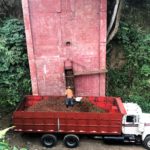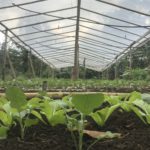In a country named for being “rich,” Costa Rica’s economy faces issues. After visiting Chrisley and Roberto’s operations, Texas A&M University students had a glimpse into the daily lives of a Costa Rican farmer. According to local sources (personal communications, Francisco and Roberto), Costa Ricans face tax increases because of increasing numbers of those who don’t work. We learned the cost of living is increasing, but salaries aren’t, which burdens Costa Rican companies. Francisco and Roberto told students their government has wasted Costa Rica’s money, which worries Ticos (native Costa Ricans) about the affordability of retirement.
When seeking economic solutions, it’s important to recognize that agricultural production has sustained Costa Rica for the last 3,000 years, dating to when humans grew maize to support themselves and their communities.
According to “Costa Rica- Information,” agricultural products account for 60% of export flows, with the majority being coffee and bananas. With revenues of $370 million annually, the coffee industry has done wonders for Costa Rica’s economy. Costa Rica exported coffee since the 1790s, making it the country’s oldest agricultural product.
Banana production became the #1 agricultural export in 1992. Farmers use specific plants like bananas for duplicate purposes. For example, Roberto uses banana trees to provide nutrients for his livestock, while also providing shade to other profitable plants.
Dairy products also count in Costa Rica’s agricultural production. Not many countries can say they produce enough fresh milk to sustain their needs, but Costa Rica can say it. Chrisley Farms, run by Chrisley and his wife Patricia, set their goal to produce homemade cheese for the surrounding community and to create jobs along the way. The intricate process requires heavy self-engineered equipment and a routine rhythm between family members who successfully produce cream, sour cream, and cheese.
Chrisley’s family supports the economy in a way many people could not comprehend. Chrisley Farms sells their cheese for $3 to $4 per ball (about 100 grams) to five local families who are intermediaries for local cheese marketing. These middlemen provide transportation methods to get Chrisley Farms’ cheese to markets. The middlemen sell the cheese in local markets for approximately $5 or $6 per cheese ball. After the cheese has made it to the market, it sells for $7 to $8 per ball.
While Chrisley understands that he could be making much larger profits for his family, he also realizes jobs are needed locally. The ability for one individual to wrap his/her brain around such a powerful idea may be the reason that Costa Rican communities are surviving the ever-changing demands on their economies.


